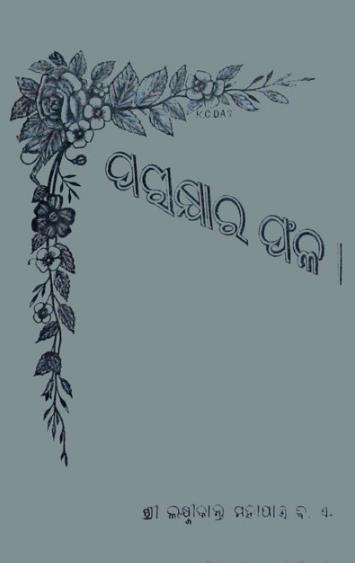Published in 1915, Pariksara Phala, a notable theatrical work by Laxmikanta Mahapatra, holds a significant place in the evolution of Odia drama. Renowned for his contributions to literature, Mahapatra’s work not only reflects the cultural ethos of his time but also engages with the social issues that were prevalent in early 20th-century Odisha. This drama represents the rich tradition of storytelling in Odisha while also embodying themes of morality, ethics, and the quest for truth.
The early 20th century was a time of awakening for many Indian languages, including Odia. The literary scene was characterized by a search for identity and a resurgence of cultural pride in the face of colonial rule. As the Indian independence movement gained momentum, artists and writers began to explore themes of national identity, integrity, and social justice. In this vibrant cultural landscape, Mahapatra’s Pariksara Phala emerged, aiming to not only entertain but also provoke thought and reflection among its audience.
Pariksara Phala, meaning The Fruit of Examination, revolves around the moral dilemmas faced by its characters as they navigate societal expectations and personal integrity. The narrative unfolds through a series of dramatic encounters that challenge the characters’ values and beliefs. Central to the story is the examination of virtue and the consequences that arise from one’s choices in life.
The plot intricately weaves together themes of justice, truth, and the implications of one’s actions. Through carefully crafted dialogues and interactions, Mahapatra critiques social norms and questions the integrity of individuals within the community. The drama resonates with audiences, prompting them to reflect on the moral implications of their own lives.
Mahapatra’s skillful characterization breathes life into Pariksara Phala. Each character is meticulously developed, representing various facets of society and embodying moral dilemmas that resonate deeply. The protagonist often finds himself in situations that test his values, allowing audiences to engage with his internal struggles.
The themes of the drama are universal and timeless, dealing with the consequences of deception, the importance of honesty, and the quest for truth. The interactions among characters often highlight the conflict between personal desires and societal expectations—a theme that remains relevant across generations.
Laxmikanta Mahapatra employs a blend of lyrical dialogue and straightforward narrative style in Pariksara Phala. His command over the Odia language is evident, as he incorporates idiomatic expressions and cultural references that enrich the text. The dialogue flows naturally, reflecting the rhythms of spoken Odia, and draws the audience into the emotional landscape of the characters.
The use of dramatic irony adds depth to the play, allowing the audience to foresee the consequences of characters’ actions while they remain unaware. This technique enhances engagement and encourages viewers to contemplate the moral lessons woven throughout the storyline.
Pariksara Phala has played a crucial role in the development of modern Odia drama, influencing subsequent playwrights and enriching the theatrical landscape of Odisha. Mahapatra’s exploration of ethical themes and social commentary has set a precedent for future generations, paving the way for more profound and reflective storytelling within Odia literature.
Books Info
| Books name | Pariksara Phala / ପରୀକ୍ଷାର ଫଳ |
| Author | Laskmikanta Mahapatra |
| No Of pages | 40 |
| Publisher | Laxmika |
| Publication | 1915 |
| Printed At | Chandradoya Press |
| Distributor | NA |

